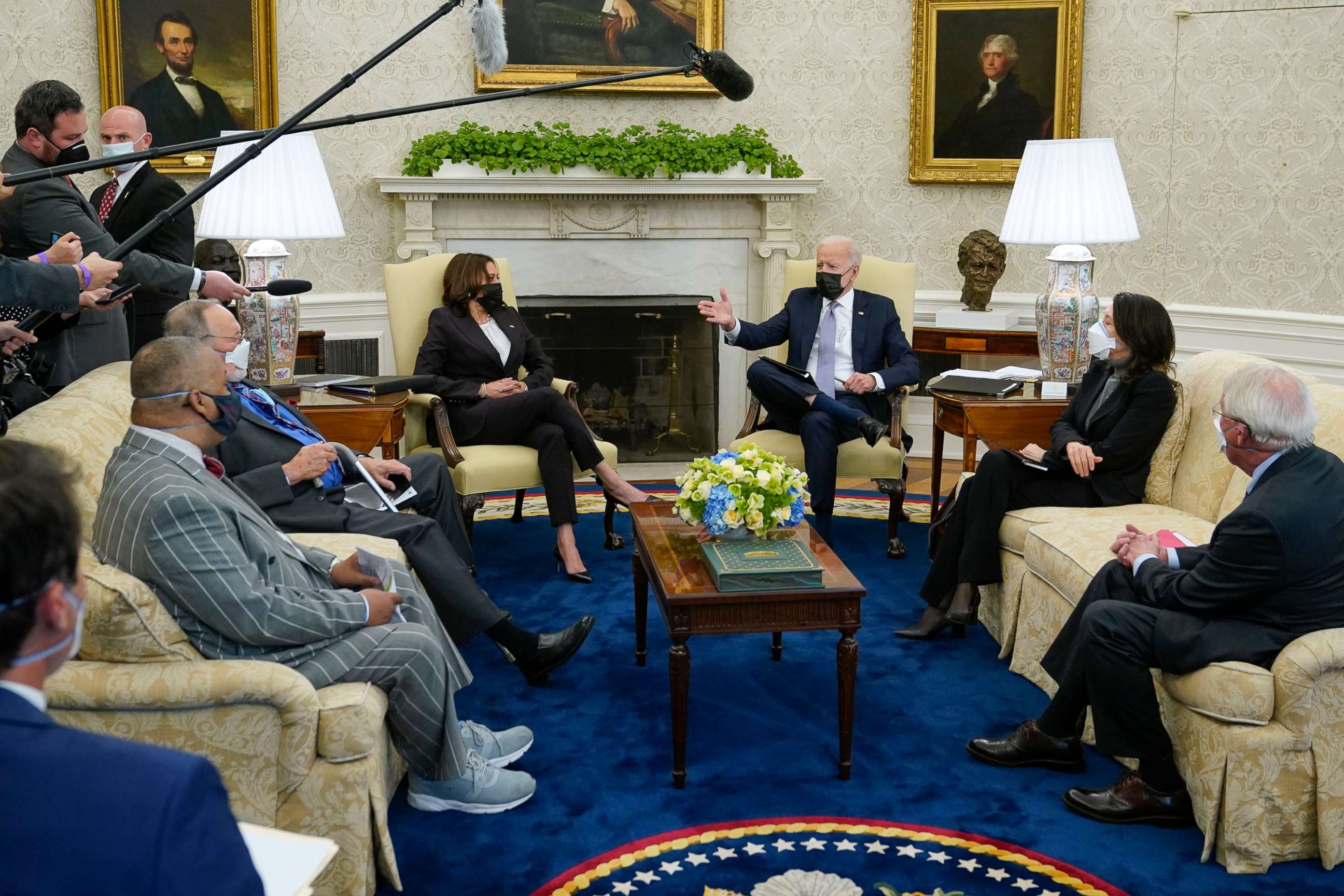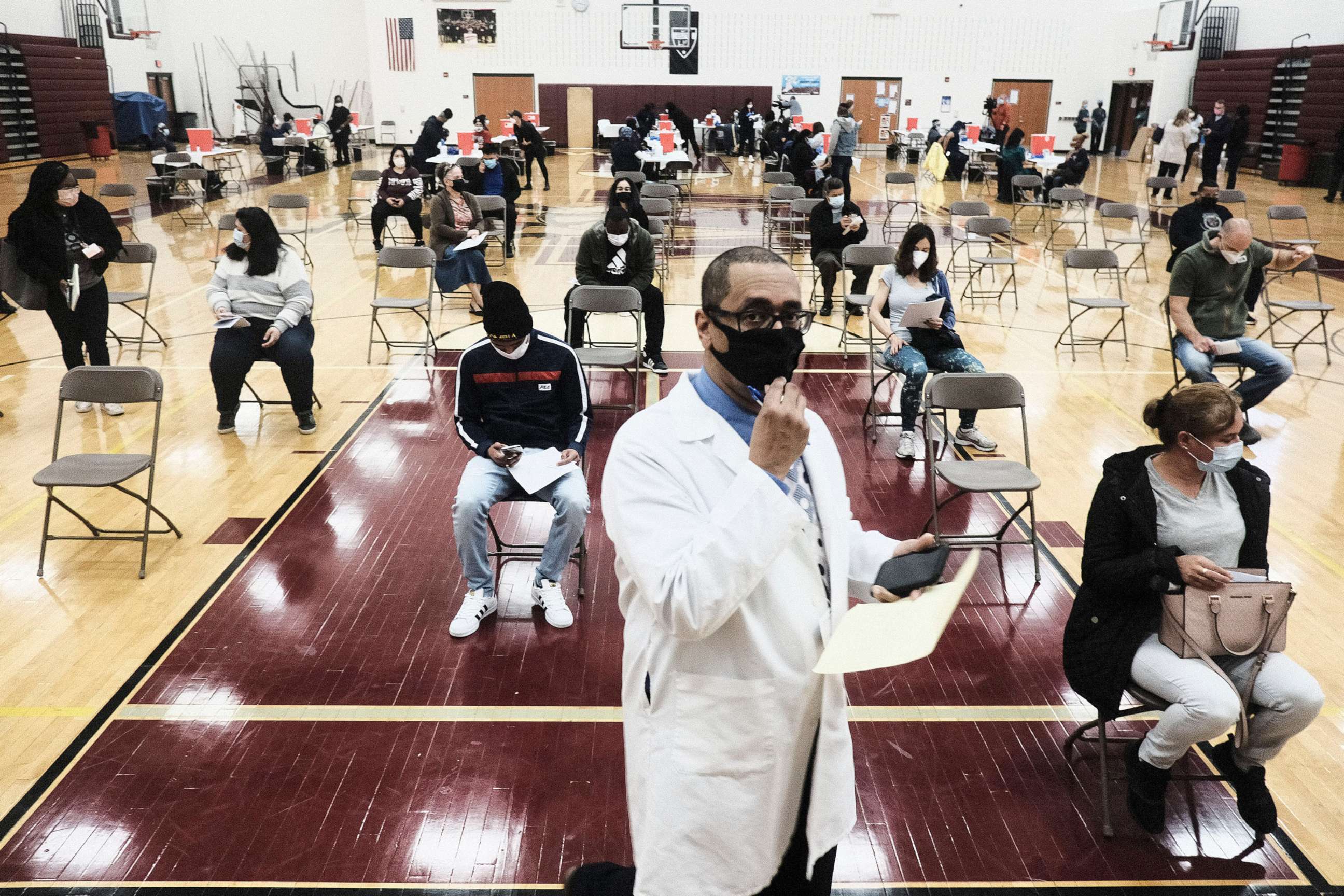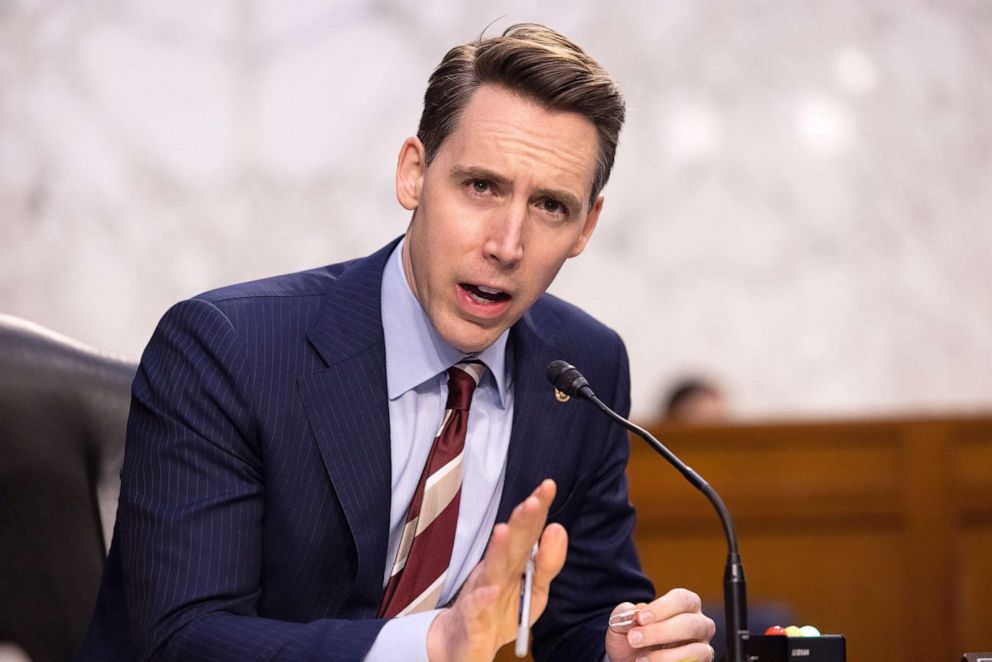Spotlight returns to police reform with little movement from White House: The Note
It presents another challenge for Biden to deliver an oft-made campaign promise.
The TAKE with Averi Harper
In the aftermath of the shooting death of Daunte Wright by police in Brooklyn Center, Minnesota, and amid the ongoing trial of Derek Chauvin, the former Minneapolis police officer charged in the murder of George Floyd, the Twin Cities metro area has reemerged as ground zero in the conversation on police reform.
It also presents another challenge to President Joe Biden to deliver on oft-made campaign promises to address police reform and root out institutional racism in the justice system. So far, there has been little movement on the issue from the Biden administration.
On Monday, White House Domestic Policy Council Director Susan Rice announced that the administration wouldn't pursue the police oversight commission it promised to establish in the president's first 100 days in office. Instead, she identified passing the George Floyd in Policing Act as its "top priority" in this area.
The legislation passed the House of Representatives last month, but its chances of passing in the Senate are slim -- at best -- where it faces staunch Republican opposition.
During a briefing Monday, Senior White House Correspondent Mary Bruce asked what steps the White House would take to pressure Congress, but press secretary Jen Psaki didn't offer clear insight on what the administration is doing to ensure the bill gets to Biden's desk for his signature.

Biden urged calm in the Twin Cities, where authorities enacted a curfew in an effort to stem protests following Wright's shooting. Biden, in an exchange with reporters Monday, made no mention of the legislation, but said there is "absolutely no justification" for looting while acknowledging "the anger, pain and trauma that exists in the Black community."
Undoubtedly, there will be many who wish the Biden administration would address police reform with the same urgency Biden addressed looting in the aftermath of Wright's killing.
The RUNDOWN with Alisa Wiersema
The Biden administration's goal to expand vaccine eligibility to all adults by May is on the horizon, but the White House is still facing immediate challenges in its approach to aiding states currently experiencing spikes in coronavirus cases amid ongoing vaccine distribution hurdles. The dual problem is becoming especially apparent in the upper Midwest, where cases and deaths are on the rise.
To combat the surge in Michigan, Gov. Gretchen Whitmer called on her constituents to voluntarily take a reprieve from indoor dining, gatherings and youth sports. And now that all Michiganders ages 16 and older are eligible for vaccinations, Whitmer said the state needs more vaccine doses from the federal government to get everyone inoculated and push back against the current outbreaks.
"What's happening in Michigan today, can be happening in other states or other parts of the country tomorrow, and that's why it's important to squash this," she said on Monday during a visit to a mass vaccination site.

The White House is responding by sending additional therapeutic and testing resources to help mitigate the surge on the ground but is adhering to its policy of being "fair and equitable around the country" by allocating doses according to state population. Meanwhile, Centers for Disease Control and Prevention Director Dr. Rochelle Walensky said Monday that sending more vaccines to Michigan would take weeks to make a tangible difference in the surge.
Although Whitmer and Lt. Gov. Garlin Gilchrist expressed gratitude to the White House for the steps taken so far, they said more can be done.
"They've asked us to make sure that we are spreading vaccine doses to the places that need them most in-state, we need a national hotspot strategy that does that for the entire country," Gilchrist said during a recent interview with CNN.
The TIP with Soo Rin Kim
Controversy does not appear to have slowed down support for some Republican lawmakers at the center of Washington's political drama.
Sen. Josh Hawley, R-Mo., who led the opposition against election certification earlier in 2021, raised $3 million from more than 57,000 donors in the first three months of this year, his campaign manager told ABC News on Monday. The haul is a break from his relatively slower fundraising operation since his first election. Instead, donations poured in within weeks after the Jan. 6 Capitol riot despite three high-profile donors in Missouri disavowing him and more than two dozen prominent companies pulling back their corporate PAC giving to political campaigns.

Freshman Rep. Marjorie Taylor Greene, R-Ga., a MAGA firebrand and an ardent supporter of former President Donald Trump, also boasted an eye-popping sum of more than $3.2 million from 100,000 donors in the first quarter of this year, according to her campaign spokesperson. This tops, not only the total amount she raised as a candidate during the entire 2020 election cycle, but also the first quarter fundraising records set by some of the other top fundraisers in the House.
As we await full campaign disclosure reports due on April 15, Greene and Hawley's fundraising success in the first three months of this year offers a glimpse into what the political fundraising landscape has been like since the historic November election and the unprecedented attack on the Capitol that followed.
THE PLAYLIST
ABC News' "Start Here" podcast. Tuesday morning's episode features ABC News' Stephanie Ramos in Brooklyn Center, Minnesota, where protests have turned violent following the police killing of Daunte Wright. ABC News Chief Legal Analyst Dan Abrams tells us what to make of emotional testimony from George Floyd's brother in Derek Chauvin's murder trial. And ABC News Senior Foreign correspondent Ian Pannell gives us the latest on a power outage targeting nuclear facilities in Iran. http://apple.co/2HPocUL
ABC News' "In Plain Sight: Lady Bird Johnson" podcast. It's 4 a.m. when Lyndon wakes up Lady Bird to the news that Sen. Robert Kennedy has been shot. This episode takes us through the tragic hours of vigil as the nation grapples with his death -- the third political assassination in five years and just two months since the murder of Martin Luther King Jr. We're led by Lady Bird's experience of these days -- the nonstop TV coverage, the hushed atmosphere in the White House and her vivid impressions of the funeral in New York, including a tense encounter with Jacqueline Kennedy. In the aftermath, it's a bittersweet final months for the Johnsons' presidency: a final push for their ambitious projects, last-minute bids to draft Lyndon to run again. The season ends with the Johnson family at home in Austin, watching a chaotic convention play out in Chicago from their living room at the LBJ Ranch. podcasts/in-plain-sight/
ABC News Live presents a pair of specials to mark the first 100 days of the most diverse Congress in history as the symbolic milestone approaches for President Joe Biden and his administration. At 8 p.m., Congressional Correspondent Rachel Scott spends the first 100 days with Rep. Nancy Mace, the first female Republican lawmaker from South Carolina, and Rep. Marilyn Strickland the first African American and first Korean American in the House from Washington State. Through video diaries and one-on-one time, viewers will see them living through the attack at the Capitol and starting their work on behalf of their constituents. At 10 p.m., Senior Washington Reporter Devin Dwyer takes a closer look at the promises Biden made on the campaign trail and the problems he must now confront. Plus, ABC News' Chief White House Correspondent Cecilia Vega will moderate a conversation with ABC News' first all-female White House Correspondent team, including Mary Bruce, MaryAlice Parks and Karen Travers to make sense of the White House transition from former President Donald Trump to Biden. https://abcn.ws/31xvow8
WHAT YOU NEED TO KNOW TODAY
Download the ABC News app and select "The Note" as an item of interest to receive the day's sharpest political analysis.
The Note is a daily ABC News feature that highlights the key political moments of the day ahead. Please check back tomorrow for the latest.




